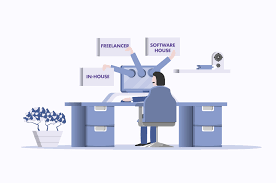Innovative Solutions from a Leading Software Development House
The Role of a Software Development House in Today’s Tech Landscape
In the fast-paced world of technology, software development houses play a crucial role in bringing innovative ideas to life. These specialized companies are dedicated to creating custom software solutions that meet the unique needs of businesses and individuals.
Software development houses employ talented teams of developers, designers, project managers, and quality assurance specialists who work together to design, build, and maintain software applications. They leverage their expertise in programming languages, frameworks, and tools to deliver high-quality products that drive efficiency and productivity.
Key Responsibilities of a Software Development House:
- Requirement Analysis: Understanding the client’s needs and defining project requirements.
- Design and Development: Creating software architecture and writing code to build functional applications.
- Testing and Quality Assurance: Conducting thorough testing to ensure the software performs as intended.
- Deployment and Maintenance: Deploying the software and providing ongoing support and updates as needed.
The Benefits of Working with a Software Development House:
Collaborating with a software development house offers several advantages, including:
- Expertise: Access to a team of skilled professionals with specialized knowledge in various technologies.
- Creative Solutions: Innovative ideas tailored to meet specific business requirements.
- Timely Delivery: Efficient project management processes that ensure timely delivery of projects.
- Cost-Effectiveness: Customized solutions that optimize resources and maximize ROI.
- Ongoing Support: Continued maintenance and support services to keep software running smoothly.
In conclusion, software development houses play a vital role in driving digital transformation by providing custom software solutions that empower businesses to stay competitive in today’s ever-evolving tech landscape. Their expertise, creativity, and dedication make them valuable partners for organizations looking to leverage technology for growth and success.
7 Essential Tips for Optimizing Your Software Development House
- Establish clear communication channels among team members.
- Adopt version control systems to track changes in the codebase.
- Encourage continuous learning and skill development for employees.
- Prioritize code reviews to maintain code quality and identify issues early on.
- Implement automated testing to ensure software reliability and reduce bugs.
- Document code, processes, and decisions to facilitate knowledge sharing within the team.
- Regularly update software tools and technologies to stay current with industry trends.
Establish clear communication channels among team members.
Effective communication is essential within a software development house to ensure seamless collaboration and project success. By establishing clear communication channels among team members, such as regular meetings, project management tools, and open lines of dialogue, information flows smoothly, ideas are shared efficiently, and potential issues are addressed promptly. Clear communication fosters a cohesive team environment where everyone is on the same page, leading to improved productivity, better decision-making, and ultimately delivering high-quality software solutions that meet client expectations.
Adopt version control systems to track changes in the codebase.
Adopting version control systems is essential for a software development house to efficiently track changes in the codebase. By using tools like Git or SVN, developers can easily manage and collaborate on code, keep track of revisions, and revert to previous versions if needed. Version control systems provide a centralized repository for code, ensuring better organization, collaboration, and overall project management. This practice not only enhances productivity but also helps maintain code integrity and transparency throughout the development process.
Encourage continuous learning and skill development for employees.
Encouraging continuous learning and skill development for employees is essential for a software development house to stay competitive and innovative in the ever-evolving tech industry. By investing in training programs, workshops, and opportunities for professional growth, employees can enhance their expertise in programming languages, tools, and methodologies. This commitment to ongoing learning not only benefits individual team members by expanding their knowledge and capabilities but also strengthens the overall capabilities of the software development house to deliver cutting-edge solutions that meet the diverse needs of clients.
Prioritize code reviews to maintain code quality and identify issues early on.
To ensure the quality and reliability of software applications, it is essential for a software development house to prioritize code reviews. By conducting thorough code reviews, developers can identify potential issues early in the development process, allowing them to address and rectify any issues before they escalate. This practice not only helps maintain code quality but also promotes collaboration among team members, fosters knowledge sharing, and ultimately leads to the delivery of robust and error-free software solutions.
Implement automated testing to ensure software reliability and reduce bugs.
Implementing automated testing is a crucial practice for any software development house to ensure the reliability of software and minimize the occurrence of bugs. By automating the testing process, developers can efficiently run test cases repeatedly to catch potential issues early in the development cycle. This not only helps in identifying bugs before they reach production but also improves the overall quality of the software by providing continuous feedback on code changes. Automated testing ultimately leads to more stable and reliable software products, enhancing user experience and reducing maintenance costs in the long run.
Document code, processes, and decisions to facilitate knowledge sharing within the team.
Documenting code, processes, and decisions within a software development house is essential for fostering effective knowledge sharing among team members. By maintaining clear and detailed documentation, team members can easily understand the rationale behind design choices, implementation strategies, and project decisions. This practice not only promotes consistency in development practices but also empowers team members to collaborate more efficiently, troubleshoot issues effectively, and onboard new members seamlessly. Ultimately, comprehensive documentation serves as a valuable resource that enhances communication, promotes transparency, and contributes to the overall success of the team’s projects.
Regularly update software tools and technologies to stay current with industry trends.
To ensure the success and relevance of a software development house, it is essential to prioritize the regular updating of software tools and technologies. By staying current with industry trends, these companies can leverage the latest advancements to enhance their development processes, improve efficiency, and deliver cutting-edge solutions to their clients. Embracing updates also allows software development houses to remain competitive in a rapidly evolving tech landscape, demonstrating their commitment to innovation and continuous improvement.




